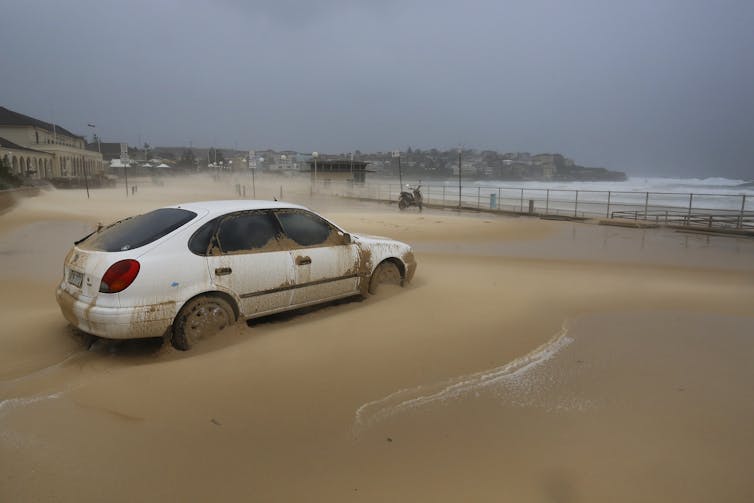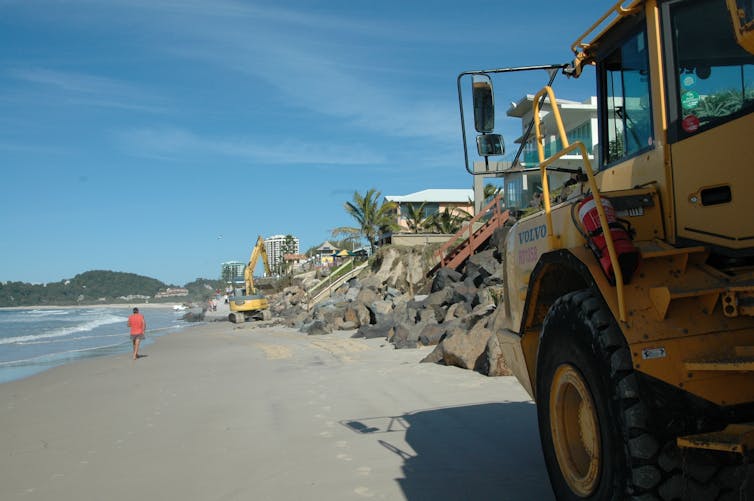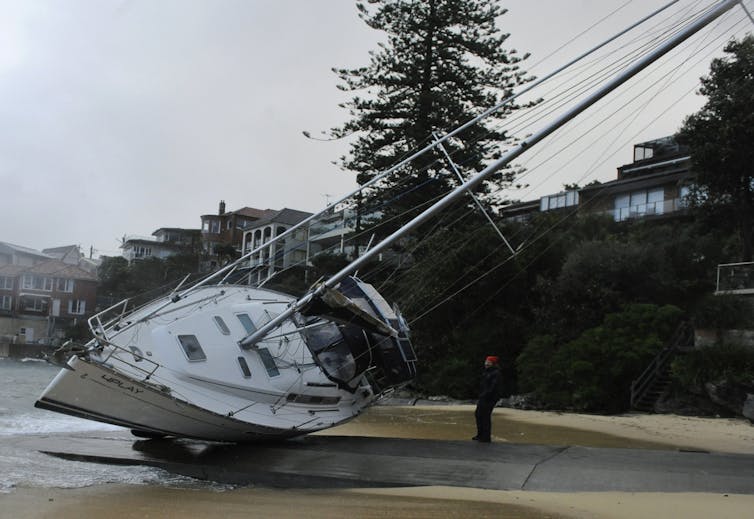Water may soon lap at the door, but still some homeowners don't want to rock the boat
- Written by Vanessa Bowden, Postdoctoral research fellow, University of Newcastle
It is becoming increasingly possible that sea-level rise of a metre or more will occur this century. You might expect this threat to preoccupy coastal homeowners. But many deny the need to act, for fear their property values will fall.
This particular brand of climate denial presents a conundrum for governments and local councils, which must plan urgently for climate change. The very act of officials identifying homes exposed to sea-level rise can be vehemently opposed by the owners, let alone policies to deal with it.
This is an urgent problem. As long as we keep failing to reduce global carbon emissions, adapting to the inevitable changes in our climate is vital. But winning cooperation from coastal property owners requires more than just talking about the science.
 A car covered in sand near Bondi Beach, Sydney after heavy storms in 2015.
David Moir/AAP
A car covered in sand near Bondi Beach, Sydney after heavy storms in 2015.
David Moir/AAP
A tide of irrefutable facts
An Intergovernmental Panel on Climate Change report released this month warned sea levels are rising faster than we thought. This will lead to more flooding, storm surges and inundation than previously modelled.
In Australia, 85% of people live within 50km of the coast. In 2009, a federal assessment estimated that up to 247,600 Australian homes were at risk of inundation under a 1.1m sea-level rise scenario.
Read more: Rising seas threaten Australia's major airports – and it may be happening faster than we think
Authorities must manage this threat, which might include limiting development, protecting properties, or planning a retreat from some areas.
Yet our research shows that getting community support for such measures can be contentious and time-consuming.
 Waterfront properties in Point Piper, Sydney. Some 85% of Australians live near the coast.
JOEL CARRETT/AAP
Waterfront properties in Point Piper, Sydney. Some 85% of Australians live near the coast.
JOEL CARRETT/AAP
Property values are king
We researched Lake Macquarie in New South Wales, a council area of about 200,000 residents. Lake Macquarie City Council is a recognised leader in climate adaptation policy.
Lake Macquarie is a large coastal estuary vulnerable to sea-level rise. It has been identified as one of six council areas in Australia at highest risk of inundation. Up to 6,800 buildings in the area – about 10% – could be at risk from sea-level rise and storm surges this century.
In response, the council limited development in the most vulnerable areas and in 2012 began community consultation. This included working with residents to develop an adaptation plan, released in 2016.
Read more: A landmark report confirms Australia is girt by hotter, higher seas. But there's still time to act
In 2017 and 2018, we interviewed current and former councillors and council staff, local businesspeople and residents about the consultation process.
We found there was initially strong resistance to the council’s policy attempts. Community members expressed concern that acknowledging the need to adapt to sea-level rise would reduce property prices and increase home insurance costs.
The potential worst-case scenario, being required to abandon one’s home, was strongly resisted by the community.
 Heavy machinery moves onto Palm Beach on the Gold Coast to repair cliffs carved out of the front yards of beachfront homes.
Tony Bartlett/AAP
Heavy machinery moves onto Palm Beach on the Gold Coast to repair cliffs carved out of the front yards of beachfront homes.
Tony Bartlett/AAP
Such community opposition is common across Australia. The Queensland property industry lobbied against state requirements that would have barred new development until climate adaptation plans were in place. At Lakes Entrance in Victoria, coastal residents have complained that adaptation measures are “taking away people’s money … because they’re going to suffer financial loss”.
The problem of climate denialism
In 2012 when community consultation began, property developer Jeff McCloy told the Sydney Morning Herald he was considering suing the council over its policies, describing concern over sea-level rise as “unjustified, worldwide idiocy”.
People have a tendency to want to see or feel the impacts of climate change before they agree to actions they see as conflicting with their priorities.
Property owners who live near oceans or lakes may not have observed rising sea levels or other climate change effects, and sometimes hesitate to believe it will be a future problem, even if flood map modelling shows otherwise.
The proliferation of climate scepticism in public discourse provides ready-made arguments to which some property owners, fearful of climate change impacts, can attach themselves.
Read more: Climate change: sea level rise could displace millions of people within two generations
We found that these broader debates around climate change impeded Lake Macquarie council’s ability to reach agreement with residents. Those opposing the policy arranged for prominent climate sceptics to speak at public meetings, and published anti-science opinion pieces in the local newspaper.
 A yacht washed up on a beach at Little Manly Cove in Sydney in 2012 after wild storms.
AAP/Mick Tsikas
A yacht washed up on a beach at Little Manly Cove in Sydney in 2012 after wild storms.
AAP/Mick Tsikas
Where to now?
The Lake Macquarie experience shows intensive, long-term, early efforts at community engagement can overcome some community opposition to climate adaptation. After four years of consultation, the council reached agreement with residents in two areas that affected land would be filled in over time, and there would be no forced retreat from homes.
The council is continuing to plan, with community involvement. It is developing suburb-specific adaptation plans designed so residents understand the science and embrace the solutions – including the chance to identify adaptation options themselves.
But across Australia, much work remains. As global carbon emissions continue to rise and the window to act closes, it is crucial that councils, governments and communities plan for whatever the future holds. This includes implementing adaptation plans that get property owners on board.
Authors: Vanessa Bowden, Postdoctoral research fellow, University of Newcastle



















